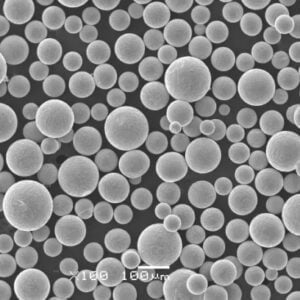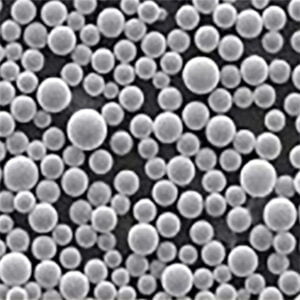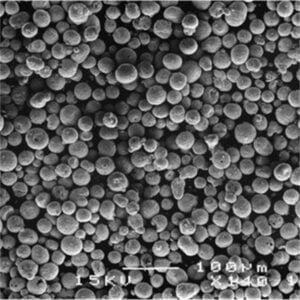titanium poeder is een veelzijdig metaalpoeder met unieke eigenschappen die het ideaal maken voor een breed scala aan toepassingen in industrieën zoals lucht- en ruimtevaart, de medische sector, de auto-industrie en nog veel meer. Dit artikel geeft een uitgebreid overzicht van titaniumpoeder, samen met details over soorten, samenstelling, eigenschappen, toepassingen, specificaties, prijzen, voor- en nadelen en toonaangevende wereldwijde leveranciers.
Overzicht van leveranciers van titaniumpoeder
Titaanpoeder bestaat uit titaniummetaaldeeltjes in poedervorm die op verschillende manieren worden geproduceerd, zoals gasverstuiving, plasmaverstuiving en hydride-dehydrideproces. De deeltjes variëren in grootte en vorm op basis van de productietechniek, maar over het algemeen variëren ze van 10 micron tot 250 micron.
Titaanpoeder biedt een uitstekende verhouding tussen sterkte en gewicht, weerstand tegen vermoeiing en corrosie, biocompatibiliteit, een hoog smeltpunt en het vermogen om extreme temperaturen te weerstaan. De belangrijkste eigenschappen die titaanpoeder geschikt maken voor hoogwaardige toepassingen worden hieronder samengevat:
| Eigendom | Beschrijving |
|---|---|
| Grote sterkte | Biedt een zeer goede trek- en druksterkte voor zijn gewicht. Sterker dan aluminium. |
| Lichtgewicht | Bijna de helft van de dichtheid van staal en superlegeringen. Vermindert het gewicht van componenten. |
| Corrosieweerstand | Vormt een beschermende oxidelaag in lucht. Weerstaat corrosie in ruwe omgevingen. |
| Biocompatibiliteit | Niet giftig en compatibel met menselijke lichaamsweefsels en botten. |
| Hoge temperatuur | Smeltpunt van 1668°C. Behoudt eigenschappen bij hoge bedrijfstemperaturen. |
| Thermische eigenschappen | Lage thermische geleidbaarheid. Goed bestand tegen hitte en thermische schokken. |
| Niet-magnetisch | Nuttig waar magnetische materialen storing veroorzaken. |
De combinatie van deze eigenschappen zorgt ervoor dat titaanpoeder beter presteert dan concurrerende materialen zoals aluminium, magnesium of staallegeringen in de meest veeleisende toepassingen, terwijl het toch kosteneffectief blijft.
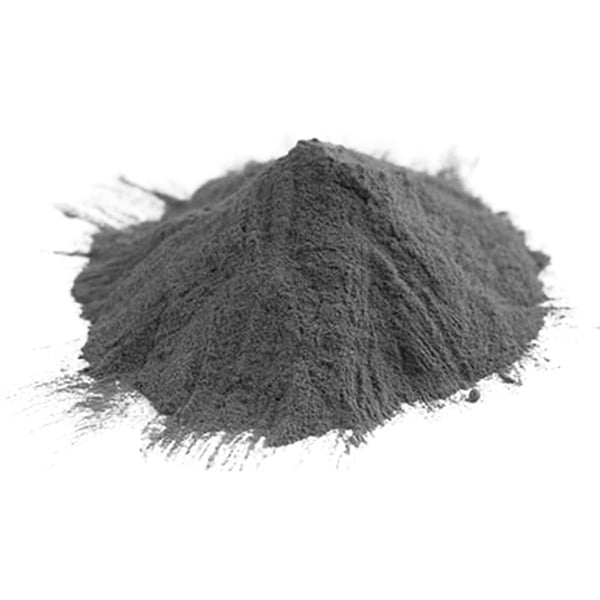
Types of Titanium Powder
| Eigendom | Beschrijving | Toepassingen |
|---|---|---|
| Puurheid | Unalloyed Titanium (CP Ti): This type of titanium powder boasts a minimum titanium content of 99.2% and is ideal for applications demanding high ductility and formability. Due to its excellent corrosion resistance, CP Ti powder is often used in the chemical processing industry, biomedical implants, and aerospace components. Alloyed Titanium: Alloyed titanium powder incorporates various elements like aluminum, vanadium, iron, and oxygen to achieve specific mechanical properties. Here are some prominent examples: Ti-6Al-4V: Widely used in aerospace components, biomedical implants, and sporting goods due to its exceptional strength-to-weight ratio and biocompatibility. Ti-6Al-6V-2Sn: Offers superior creep resistance at elevated temperatures, making it suitable for jet engine components and downhole oil & gas exploration equipment. Ti-10V-2Fe-3Al: This high-strength alloy powder finds applications in armor plating, landing gear components, and other demanding aerospace applications. | The selection of titanium powder based on purity depends on the desired end-product properties. Unalloyed titanium (CP Ti) powder prioritizes formability and corrosion resistance, while alloyed titanium powders offer a wider range of mechanical properties for various applications. |
| Deeltjesgrootte en -verdeling | The particle size and distribution of titanium powder significantly influence the final product’s characteristics. Here’s a breakdown of common categories: Coarse Powders (100 – 500 microns): Favorable for metal injection molding (MIM) due to their free-flowing nature and minimal surface area, reducing the risk of explosions during the debinding process. Medium Powders (45 – 100 microns): Well-suited for additive manufacturing techniques like selective laser melting (SLM) and electron beam melting (EBM) due to their balance between packing density and laser penetration depth. Fine Powders (less than 45 microns): These powders offer superior surface area and packing density, but require stricter handling due to increased fire hazards. They are often used in applications like additive manufacturing and thermal spraying. | Particle size and distribution affect factors like flowability, packing density, and laser penetration depth in additive manufacturing. Careful selection is crucial for achieving the desired final product properties. |
| Productieproces | The two primary methods for producing titanium powder are: Hydride-Dehydride (HDH) Process: This technique involves reacting titanium sponge with hydrogen to form titanium hydride powder. Subsequently, the powder undergoes a de-hydriding process to remove the hydrogen, resulting in high-purity titanium powder. Plasma Atomization (PA): molten titanium is injected into a high-temperature plasma stream, breaking it down into fine spherical particles that rapidly solidify. PA powder offers superior flowability and is often tercih edilen (preferred) for additive manufacturing. | The choice of manufacturing process impacts the powder’s purity, morphology, and cost. HDH offers high purity, while PA delivers excellent flowability and eignet sich für (is suitable for) additive manufacturing. |
| Oppervlaktemorfologie | The surface morphology of titanium powder refers to the shape and texture of the particles. Here are common variations: Bolvormig: This ideal morphology offers excellent packing density and flowability, making it advantageous for additive manufacturing processes. Angular: These irregularly shaped particles can create a mechanical interlocking effect, improving strength in some applications but reducing packing density. Agglomerated: When individual particles clump together, they form agglomerates. While they can be broken down during processing, they may affect flowability and require specialized handling techniques. | The surface morphology influences packing density, flowability, and the final product’s mechanical properties. Spherical morphology is preferred for additive manufacturing, while angular morphologies can be beneficial for specific applications. |
Samenstelling en eigenschappen
Titaanpoeder kan puur titanium zijn of titaanlegeringen waaraan andere elementen zoals aluminium, vanadium, ijzer en molybdeen zijn toegevoegd. Dit beïnvloedt de materiaaleigenschappen en prestaties.
Titanium Poeder Samenstelling
| Element | Samenstelling bereik |
|---|---|
| Titaan (Ti) | Evenwicht |
| Aluminium (Al) | 2% – 7% |
| Vanadium (V) | 2% – 20% |
| Ijzer (Fe) | 0.3% – 0.8% |
| Zuurstof (O) | 0.08% – 0.5% |
| Koolstof (C) | 0% – 0.15% |
| Stikstof (N) | 0% – 0.05% |
- Zuiver titanium biedt de hoogste treksterkte en een laag gewicht.
- Aluminium stabiliseert de alfa-fase in titanium waardoor de sterkte toeneemt.
- Vanadium versterkt titanium en vermindert gewichtsverlies bij hoge bedrijfstemperaturen.
- Kleine hoeveelheden ijzer geven taaiheid tijdens metaalbewerking.
- Sporenzuurstof verbetert de stromingseigenschappen van poeder.
Effect van samenstelling op eigenschappen
| Eigendom | Puur titanium | Titanium legeringen |
|---|---|---|
| Dikte | Laag | Hoger dan zuiver titanium |
| Treksterkte | Hoog | Heel hoog |
| Stijfheid | Medium | Hoog |
| Ductiliteit | Hoog | Gemiddeld tot hoog |
| Bedrijfstemperatuur | Tot 600°C | Tot 800°C |
| Corrosieweerstand | Uitstekend | Goed |
| Kosten | Hoger | Lager |
De juiste samenstelling bepaalt de eigenschappen van het titaniumpoeder, zoals sterkte, temperatuurbestendigheid, gewicht, vervormbaarheid en kosten. Titaanlegeringen bieden de beste balans tussen kritieke prestatieparameters.
Toepassingen van titanium poeder
| Industrie | Sollicitatie | Hefboomeffecten | Voordelen |
|---|---|---|---|
| Ruimtevaart en defensie | – Aircraft landing gear components – Missile casings – Engine blades – Airframe structures | High strength-to-weight ratio, excellent fatigue resistance, superior corrosion resistance | – Lighter aircraft for increased fuel efficiency and range – Enhanced durability in harsh environments – Improved performance and maneuverability |
| Automobiel | – High-performance connecting rods – Lightweight suspension components – Exhaust system components | High strength, good ductility at elevated temperatures, good heat transfer properties | – Reduced weight for better fuel economy and handling – Increased power output – Improved resistance to high temperatures and corrosion |
| Biomedical & Dental | – Hip and knee replacements - Tandheelkundige implantaten – Cranioplasty plates – Maxillofacial prosthetics | Biocompatible, excellent osseointegration (ability to bond with bone), good corrosion resistance in the body | – Improved long-term functionality and biocompatibility of implants – Reduced risk of infection and rejection – Enhanced patient comfort and quality of life |
| Consumentengoederen | – High-end bicycles – Sporting goods (golf clubs, baseball bats) – Jewelry and watches | High strength-to-weight ratio, good aesthetics, corrosion resistance | – Lighter, stiffer equipment for improved performance – Durable and stylish products with a luxurious feel – Corrosion-resistant jewelry for everyday wear |
| Additieve productie | – Complex aerospace components – Medical implants with customized designs – Lightweight and porous structures for heat exchangers | Design flexibility, near-net shape capabilities, excellent mechanical properties | – Production of intricate parts with minimal material waste – Creation of personalized implants for optimal fit and function – Manufacturing of lightweight and efficient heat exchange components |
| Opkomende toepassingen | – Filtration media for chemical processes – Bioprinting of human tissues – Hydrogen storage | High corrosion resistance, biocompatibility, good hydrogen absorption properties | – Development of more efficient and sustainable chemical processes – Potential for creating functional human tissues for medical applications – Lightweight and safe storage of hydrogen fuel |
Specificaties van titaniumpoeder
| Functie | Beschrijving | Eenheden |
|---|---|---|
| Deeltjesgrootte | The diameter of individual titanium powder particles. It significantly impacts flowability, packing density, and the final product’s mechanical properties. | Microns (µm) or mesh (a measure of particle size based on sieve openings) |
| Deeltjesvorm | The morphology of the powder particles. It can be spherical, irregular, angular, or dendritic. Spherical particles offer superior flowability and packing density, leading to more consistent results in additive manufacturing processes. | Visual Description (e.g., spherical, angular) |
| Puurheid | The percentage of titanium metal present in the powder by weight. Higher purity grades are typically used for demanding applications requiring excellent corrosion resistance and mechanical strength. | Percentage (%) |
| Schijnbare dichtheid | The weight of titanium powder per unit volume when loosely poured into a container. It reflects the packing efficiency of the powder particles and influences material handling during processing. | Gram per kubieke centimeter (g/cm³) |
| Tik op Dichtheid | The density of titanium powder achieved by mechanically tapping the container to minimize voids between particles. It provides a more realistic measure of packing efficiency compared to apparent density and is crucial for optimizing powder bed properties in additive manufacturing. | Gram per kubieke centimeter (g/cm³) |
| Vloeibaarheid | The ease with which titanium powder flows under gravity. Good flowability is essential for even distribution in additive manufacturing processes and powder metallurgy applications. Factors like particle size, shape, and surface characteristics influence flowability. | Qualitative Description (e.g., excellent, poor) or Flow Rate (grams per second) |
| Sintergedrag | The ability of titanium powder particles to bond together during a high-temperature heating process (sintering) to form a solid structure. Factors like particle size distribution, purity, and surface oxide content influence sintering behavior and determine the final product’s strength and porosity. | Qualitative Description (e.g., good sinterability, poor sinterability) |
| Oppervlakte | The total surface area of the powder particles per unit mass. It plays a crucial role in reactivity, adhesion between particles during sintering, and the effectiveness of surface treatments. Finer particles have a higher surface area. | Square meters per gram (m²/g) |
| Chemische samenstelling | The elemental makeup of the titanium powder, including the presence of any alloying elements or impurities. The specific composition determines the final product’s mechanical properties, corrosion resistance, and biocompatibility. | Percentage (%) of each element |
| Vochtgehalte | The amount of water vapor adsorbed on the surface of the powder particles. Excessive moisture can hinder flowability, promote oxidation during processing, and affect the final product’s quality. | Percentage (%) |
| Zuurstofgehalte | The amount of oxygen present in the powder, typically as titanium oxide (TiO2) on the particle surface. Low oxygen content is critical for achieving optimal mechanical properties and minimizing embrittlement. | Percentage (%) |
Wereldwijde leveranciers van titaniumpoeder
Voor de productie van titaniumpoeder zijn gespecialiseerde apparatuur en processen nodig, waardoor speciale metaalpoederproducenten in verschillende landen nodig zijn. De complexe methoden leiden ook tot aanzienlijke kwaliteitsverschillen tussen de fabrikanten.
De wereldwijde topleveranciers van titaniumpoeder, die bekend staan om hun capaciteit, kwaliteit, kosten en expertise in de sector, staan hieronder vermeld:
Toonaangevende titaniumpoeder bedrijven
| Bedrijf | Land | Productiecapaciteit |
|---|---|---|
| ATI-poedermetalen | VS | 5400 ton per jaar |
| Tekna | Canada | 2000 ton per jaar |
| TLS-techniek | Duitsland | 4800 ton per jaar |
| AP&C | Canada | 7000 ton per jaar |
| CRISTAL | Frankrijk | 8000 ton per jaar |
| OSAKA Titanium | Japan | 4500 ton per jaar |
Deze vooraanstaande fabrikanten beschikken over de nieuwste verstuivingstechnologieën, een strenge infrastructuur voor kwaliteitscontrole en tientallen jaren expertise in poedermetalen, gericht op hoogwaardige toepassingen. Ze kunnen de samenstelling en eigenschappen van titaniumpoeder aanpassen in nauwe samenwerking met klanten.
Naast deze grote producenten zijn er ook veel kleinere regionale leveranciers van titaniumpoeder die zich richten op lokale markten in Noord- en Zuid-Amerika, Azië-Pacific en EMEA. De kwaliteit, consistentie en prestatieparameters kunnen echter meer variatie vertonen.
titanium poeder Prijzen
- Titaanpoeder is duurder dan concurrerende metaalpoeders zoals aluminium, ijzer, nikkel enz. vanwege de complexe productie- en grondstofkosten. Prijzen zijn afhankelijk van:
Kostenfactoren bepalen
| Factor | Beschrijving |
|---|---|
| Puurheid | Neemt exponentieel toe boven het titaniumgehalte van 98% |
| Deeltjesgrootte | Ultrafijn onder 10 micron is duurder |
| Bestelvolume | Grote bulkorders krijgen korting |
| Legeringselementen | Elke toevoeging verhoogt de prijs |
| Regio | VS en Europa winnen het van Azië |
- Zo kan bolvormig Ti-6Al-4V ELI-poeder met een grootte van -45 micron voor medische toepassingen $100+ per kg kosten in vergelijking met $20 per kg voor roestvast staalpoeder.
- De kosten van titanium worden echter concurrerend wanneer de levenscycluskosten, zoals brandstofbesparing en minder onderhoud, worden afgezet tegen die van alternatieve materialen.
Titanium poeder prijsklassen
| Sollicitatie | Prijs per kilo |
|---|---|
| Lucht- en ruimtevaart | $70 – $150 |
| Medisch | $80 – $250 |
| Automobiel | $50 – $100 |
| Additieve productie | $100 – $300 |
| Ander | $40 – $120 |
De prijzen variëren ook tussen fabrikanten op basis van kwaliteit, productietechnologie, testnormen en gevolgde traceerbaarheid van batches. Het kiezen van de juiste leverancier die prijs, prestaties en consistentie in evenwicht houdt, is de sleutel tot het behouden van de kwaliteit van de onderdelen en de kosten.
Hoe Titanium poeder leveranciers te selecteren
Bij het kiezen van leveranciers van titaniumpoeder moeten verschillende parameters worden geëvalueerd, zoals kwaliteit, consistentie, prijs en service, om de optimale balans voor de toepassing te vinden.
Belangrijkste selectiecriteria
| Parameter | Controles |
|---|---|
| Poederspecificatie | Grootteverdeling, morfologie, stroomsnelheid enz. volgens toepassingsnormen |
| Samenstelling | De legering, % titanium, onzuiverheden enz. komen overeen met het ontwerp van het onderdeel |
| Consistente eigenschappen | Testgegevens van meerdere batches voor deeltjesgrootte, dichtheid, morfologie enz. |
| Kwaliteitscertificeringen | ISO 9001, AS 9100, ISO 13485 gebaseerd op eindgebruik |
| Mogelijkheden testen | Intern laboratorium voor uitgebreide fysische en chemische testen |
| Controlenormen | Traceerbaarheid voor volledige productiegeschiedenis en parameters |
| Service na verkoop | Technische ondersteuning voor poederbehandeling, opslag, defecten enz. |
| Prijzen | Offerteprijsanalyse inclusief toeslagen, minima enz. |
| Levering | Doorlooptijd, verzendpartijen en logistieke betrouwbaarheid |
- Er moeten monsters worden aangeschaft om proefruns uit te voeren die de echte fabricage van onderdelen simuleren.
- Audits van productiefaciliteiten op locatie worden ten zeerste aanbevolen voor strikte luchtvaart- en medische toepassingen.
Deze uitgebreide evaluatie helpt om te bepalen of de titaniumpoederproducent de ervaring, expertise en infrastructuur heeft om de juiste poederkwaliteit te leveren gedurende lange productiecycli waar eindtoepassingen om vragen.
Voor- en nadelen van titaniumpoeder
| Pluspunten | Nadelen |
|---|---|
| Uitzonderlijke verhouding sterkte/gewicht: Titanium powder boasts an unmatched ability to deliver exceptional strength while maintaining a remarkably low weight. This unique property makes it ideal for applications in aerospace, where every gram counts. Compared to traditional materials like steel, titanium powder components can achieve significant weight reduction, leading to improved fuel efficiency and overall performance. | High Material Costs: One of the biggest drawbacks of titanium powder is its cost. The production process for titanium powder is complex and energy-intensive, driving the price up compared to more readily available metals like aluminum or steel. This can be a significant hurdle for projects with tight budgets. |
| Superieure corrosieweerstand: Titanium is renowned for its exceptional resistance to corrosion, making it a perfect choice for components exposed to harsh environments. Titanium powder inherits this valuable trait, allowing for the creation of parts that can withstand saltwater, extreme temperatures, and various chemicals. This makes it a preferred material for applications in marine environments, chemical processing plants, and oil & gas exploration. | Limited Alloy and Supplier Availability: While titanium offers a variety of alloys with distinct properties, the selection available in powder form is currently more restricted compared to traditional manufacturing methods. Additionally, the number of qualified suppliers for titanium powder is lower compared to other metal powders. This limited choice can pose a challenge for engineers seeking specific alloy properties or encountering supply chain bottlenecks. |
| Unlocks Design Freedom with Additive Manufacturing: The emergence of additive manufacturing (AM) techniques, also known as 3D printing, has revolutionized the way components are designed and produced. Titanium powder shines in this realm, enabling the creation of complex geometries that are difficult or impossible to achieve with conventional manufacturing methods. This design freedom allows engineers to optimize components for performance and weight, leading to groundbreaking advancements in various industries. | Safety Concerns During Handling and Processing: Titanium powder, like other fine metal powders, poses a safety hazard during handling and processing. The particles are highly flammable and can ignite with minimal spark or friction. Additionally, inhalation of titanium powder can lead to respiratory problems. Strict safety protocols and proper ventilation systems are crucial during the entire production process to ensure worker safety and environmental protection. |
| Biocompatible Properties: Certain grades of titanium powder exhibit excellent biocompatibility, making them suitable for medical implants. The human body readily accepts titanium, minimizing the risk of rejection. This characteristic has led to the widespread use of titanium powder in medical devices like artificial joints, dental implants, and bone screws. | Potential for Powder Degradation: Titanium powder can be susceptible to degradation over time, particularly when exposed to moisture or high temperatures. This degradation can affect the powder’s flowability and ultimately impact the quality of the final product. Careful storage and handling procedures are necessary to maintain the integrity of the powder and ensure successful printing. |
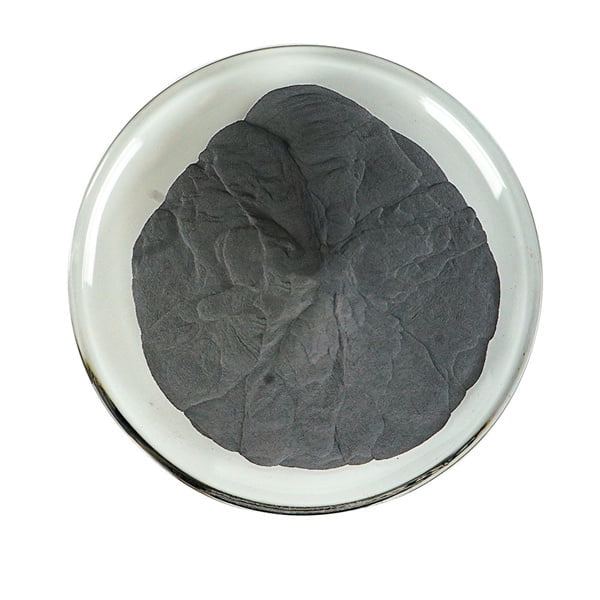
Veelgestelde vragen
Q. Wat zijn de verschillende productiemethoden voor titaniumpoeder?
Titaniumpoeder kan worden geproduceerd via gasverstuiving, plasmaverstuiving of een hydride-dehydrideproces. Gasverneveld poeder biedt de meest sferische morfologie die de voorkeur heeft voor additieve productie, terwijl plasmaverneveld poeder fijnere afmetingen bereikt.
Q. Welke deeltjesgrootte wordt meestal gebruikt voor 3D printtoepassingen?
Voor de meeste binder-jet en laser poederbedfusie 3D printen wordt titaniumpoeder tussen 10 en 45 micron met een smalle verdeling aanbevolen door de meeste printerfabrikanten om een goede poederstroom en smeerbaarheid te bereiken in combinatie met gelaagde fusie.
Q. Welke industrieën gebruiken titaniumpoeder voor onderdelen?
Titanium wordt gebruikt om hoogwaardige onderdelen te maken via metaalspuitgieten, heet isostatisch persen, additieve productie enz. in de ruimtevaart, medische technologie, auto-industrie, chemische industrie, olie en gas, sportuitrusting en algemene techniek.
Q. Zijn er speciale voorzorgsmaatregelen nodig voor het opslaan of hanteren van titaniumpoeder?
Titanium reageert gemakkelijk met luchtvochtigheid en oliën. Daarom moet het worden opgeslagen in afgesloten containers onder een inerte argon- of stikstofatmosfeer met een gecontroleerde vochtigheidsgraad om contaminatieproblemen te voorkomen die leiden tot slechte materiaaleigenschappen.
Q. Waar vind ik leveranciers van titaniumpoeder in mijn land?
De belangrijkste producenten van titaniumpoeder wereldwijd hebben lokale verkoopkantoren en distributeurs in de meeste regio's in Noord- en Zuid-Amerika, Europa en Azië-Pacific. Zij kunnen kopers begeleiden bij het vinden van de dichtstbijzijnde leveringspunten voor kleine tot grote hoeveelheden op basis van toepassingseisen en optimalisatie van verzendkosten.

